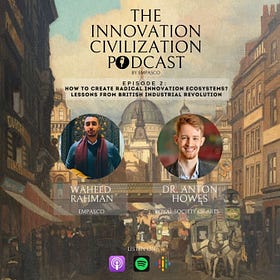Anton Howes
Historian in Residence at the Royal Society for the Encouragement of Arts, Manufactures and Commerce (RSA), Anton joined us to explore innovation, economic history, and how societal changes drive tech
Anton Howes is a historian specializing in the history of innovation. He has been the historian-in-residence at the RSA since 2017, where he penned the definitive history of the institution in his acclaimed book Arts and Minds: How the Royal Society of Arts Changed a Nation. The book sheds light on over three centuries of social reform led by the RSA, from early projects like planting millions of trees to mid-20th century environmentalism. His research offers a hidden history of the role that RSA has played in shaping British society.
In addition to his role at the RSA, Howes serves as Head of Innovation Research at The Entrepreneurs Network, where he focuses on encouraging entrepreneurship and technological advancement. He is also a Visiting Fellow at King’s College London and has lectured on economic history, particularly about the British Industrial Revolution. His academic journey includes a PhD in Political Economy from King’s College London and postdoctoral research at Brown University.
How to Create Radical Innovation Ecosystems? Lessons from British Industrial Revolution
In our second episode, our Co-Founder Waheed Rahman (@iwaheedo) is joined by British historian and author Dr. Anton Howes (@antonhowes) where we uncover the roots of innovation in the modern world, including how to create innovation ecosystems with a focus on 16th-19th century Britain as a case-study.
Biography
Anton Howes was born in the United Kingdom and has devoted his career to understanding the role of innovation in societal progress. He is especially interested in the spread of innovative practices and how people adopt an "improving mentality." This focus on social and cultural factors in technological change has influenced much of his work, particularly his study of Britain's acceleration in innovation during the 18th century, which led to the Industrial Revolution.
Thought Leadership on Innovation
As an advocate for historical perspectives on innovation, Howes argues that innovation is not just a technological process but also a cultural one. He frequently speaks and writes about the history of invention, examining how the past can inform modern strategies for fostering innovation and entrepreneurship.
Howes’ interdisciplinary approach, blending history, economics, and innovation, continues to impact the way we think about the intersection of technological change and societal development. He envisions a world where understanding the past can help us better shape the future of global innovation systems.
His work at the RSA and beyond offers insights into how institutions, innovators, and policymakers can collaborate to tackle the challenges of today, drawing lessons from history to inspire future reforms and breakthroughs.
4o



